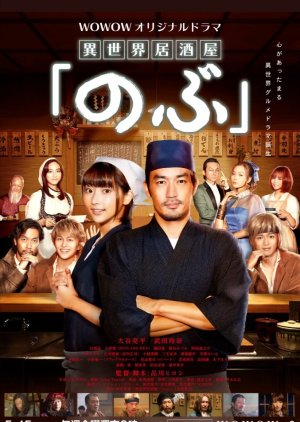
Această recenzie poate conține spoilere
Where everybody knows ye olden name
Isekai Izakaya Nobu was a sweet drama featuring a wide variety of Japanese bar foods. It was very similar to the Shinya Shokudo series if the chef had been serving patrons from a medieval world with two moons that never waxed or waned differently.The classically handsome Otani Ryohei as Chef Yazawa and his Girl Friday, Takeda Rena as Senke Shinobu opened Nobu and discovered their door led to an alternate world named Aitelia, where apparently the only thing the locals had to eat was wurst and potatoes. There was a small effort to insert some German words in the first episode, and all of the characters had Germanic or English names. Everyone was badly dressed like they were going to a medieval fair, complete with blonde or red wigs.
The locals were dutifully dazzled by things like clean drinking water, beer on tap, glass mugs, and a chef's knife. More so, they yelled and screamed and emoted with every bite of flavorsome food that was offered to them. I suppose if your entire diet consisted of the same boiled food every day, and hopefully the makers of this drama were not implying that European food was that awful, fried chicken would be a reason to rejoice. They tended to lay it on thick in every episode. Despite it being a decent sandwich, I refuse to believe that discovering an egg salad sandwich was a rapturous and life changing event. Opinions may vary.
The regulars included Hans and Nicklaus, two guards of the city along with their boss, the capable Bertholdt. City worker Gernot enjoyed his Pasta Neopolitan (gonna have to trust the Japanese about spaghetti with ketchup) while the local clergy used whatever excuse he could find to join in with a glass or three of sake. The three warring water guild members became fast friends when Chef showed them the glories of eating eel. Of course, no story is complete without a villain and the head of the city council made an appearance to threaten everyone. Could good food and beer conquer all and save the day and the girl?
As fun as the drama could be, the acting was rather weak and campy. It took some time for the story to gain any traction beyond, "Wow! This is a taste explosion in my mouth! How did I never know that salted fish guts was so amazing!" How or why Nobu crossed worlds was never explained. Most importantly, I'm curious how Chef exchanged the Aitelia money to pay his bills in the real world. Did the beer vendor accept foreign, very foreign, gold coins without asking any questions?
The majority of characters were very likeable and most of the food was appealing. Overall, Nobu was an easy and relaxing watch. To quote Yentl, "And though there's nothing much to challenge your mind here, who cares when the food's so delicious?" Nobu might not be a grand destination, but as a quick trip into a pub to relax and have a tasty meal and conversation, it wasn't a bad diversion.
4/9/23
Considerați utilă această recenzie?

Această recenzie poate conține spoilere
Beautiful Story Telling
This show was like reading a fantasy book, or watching a fantasy RPG video game in action. Each episode was charming and cozy within Tavern Nobu. The familiar feeling of Midnight Diner was certainly there, however, this tavern really does have a life of its own!I really liked how each character began as a brand new interaction and then slowly integrated into the story; almost as if you were growing your traveling party in a game. With each new character you got a new set of information about the town, or new powers or skills to add to your group. This show has a very calming-"serotonin"-like feel to it, which the music supported very well; almost sending me in to a trance a couple of times! Each episode introduced a new character or a new food for Nobu, so it was like learning something new each time without the need for unnecessary and sometimes cheesy dramatics. If you're looking for a calm, cheerful, enthralling, magical show then this show is definitely for you!
I'm curious as to why they only had a handful of backstory for the "two main characters" (i don't think there was truly any "main" character[s] within this show; everyone really had their own time in the spotlight), however, and I would love to know more about not only their backstory, but where they and Tavern Nobu go from here! I'm so glad there's a special and two more seasons!
I can see why people would compare this show to Midnight Diner, but I can guarantee that, while it is definitely familiar, that it is also definitely NOT Midnight Diner's exact copy within a fantasy world. This story is whimsical, full of fantastical things and epic stories, not to mention the atmosphere of the show is completely different. With this show, I feel like I stepped in to a video game or in to a fantasy anime or book. This show had me captivated from episode one! This is one of the most creative, imaginative, unique, talented, genuinely realistic(ish), funny, honest, and enthralling shows I have ever seen.
Considerați utilă această recenzie?

Making the world a better place by lovingly preparing one dish at a time.
There's not much plot, apart from the last two episodes. But that doesn't matter, it's just about people cooking, serving and eating different, mostly Japanese dishes.Really, if you're waiting for an explanation for why there's a connection between the worlds, or how the owner can buy things in our world with currency from the other world, you'll be disappointed.
The whole thing is a thinly disguised food appreciation show, with some loveable characters who do the appreciation.
I was reminded of Wakako Zake.
Bonus points for the German, the texts that were readable had actually decent German. (If I wanted to nitpick, I'd mention that the Fraktur font needs a "long s" at the beginning and in the middle of a syllable instead of the "round s" (only used at the end of a syllable), but I won't.)
The isekai the tavern connects to has elements of different centuries -- for example: references to a northern God whose name sounds a lot like "Oden" (early middle ages, maybe around 6th cent.) or the buildings in the town (late middle ages to early renaissance, so ca. 14th to 16th cent.) or the clothing (somewhere in the 17th and 18th cent.) or the mention of Kartoffeln as main staple of food (late 18th and 19th cent.) and the Fraktur font (mainly late 19th and early 20th cent.) -- so it's not medieval, but firmly in the realm of fantasy.
If you just want to see how some Japanese-style food can make a society a bit better, and want to relax watching people enjoy this food while bickering a bit, then this might be for you.
Considerați utilă această recenzie?

Disappointing
I loved the first episodes, but very quickly the whole plot point of different doors into different times got lost and was non-existent by the end. The plot seemed almost like an afterthought. The weak plot was presented by some varied acting, some delightful, some poor. The costumes and characters were badly done in the "western" segments, but you can't expect that to be good from a different culture. I tried to be tolerant, but by the end it really grated. I certainly won't re-watch this.Considerați utilă această recenzie?




































